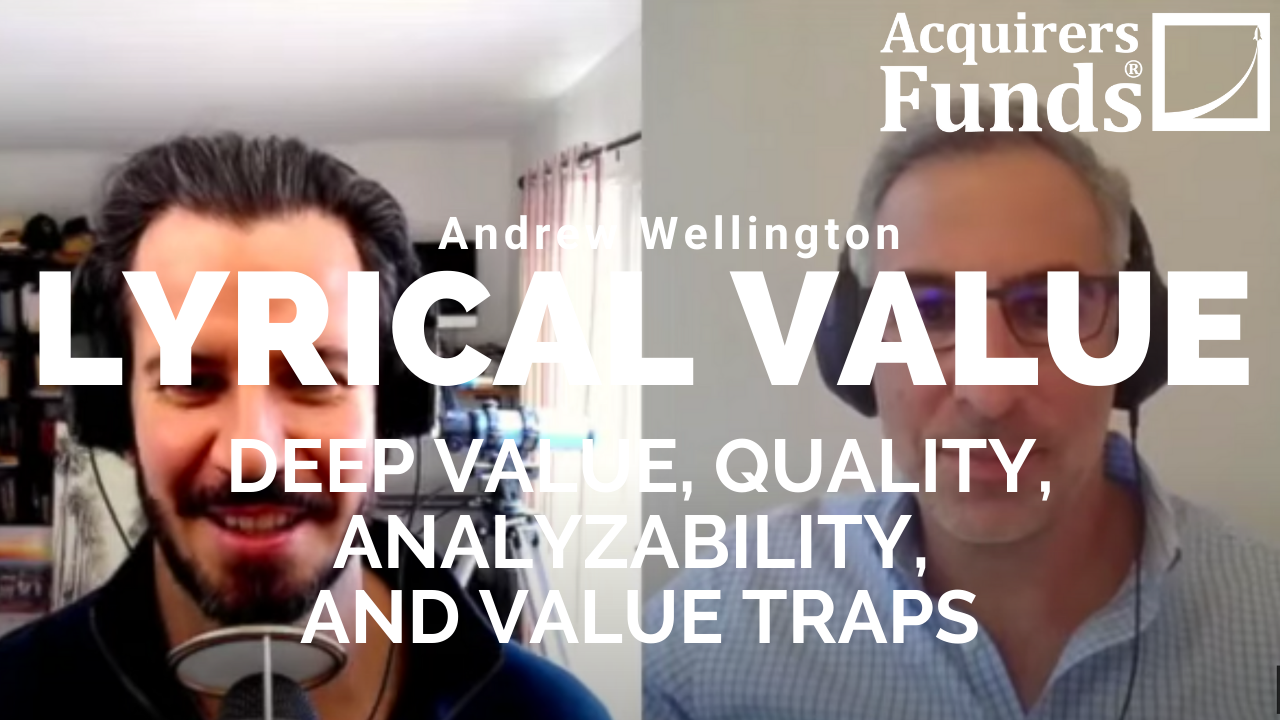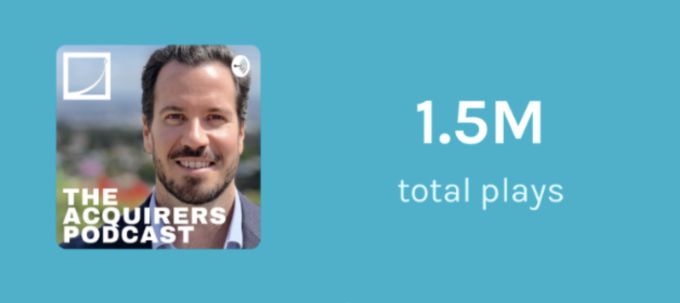During his recent interview with Tobias, Andrew Wellington, Co-Founder and Managing Partner at Lyrical Asset Management discussed Never Rebalance & Rarely Trim. Here’s an excerpt from the interview:
Tobias: Okay, that makes sense. You’ve got a position in the portfolio, it grows pretty rapidly relative to the rest of the portfolio. How do you handle that? Do you trim them back? I saw that in one of your notes, there was no rebalancing?
Andrew: Correct. We don’t rebalance. It’s because the data tells us not to. Right now, the data says not to, but it’s by a small margin, what we find is– we don’t rebalance, but we can test, what would our returns be if we did monthly rebalancing because we know all the stocks. We’re just changing the weights. Well, what if we did semiannual rebalancing? Or what if we did annual rebalancing? We tested all those. What we basically find out is, our returns end up the same. Within a very small range. Now from year to year, we’ve been around for 12 years or so. From year to year, some years rebalancing our returns would be one or two points higher, some years one or two points lower. Over 12 years, it’s almost entirely canceled itself out. Except the best scenario of all those by a small margin is the don’t rebalance at all.
Tobias: You don’t get taxed to, if you do that.
Andrew: Rebalancing has a lot of negatives when you do it. You incur trading costs, you have the potential for trading errors, it’s less tax efficient. There should be some provable positive that you are going after to offset all those negatives. I would say the data clearly shows that for us, at least, I don’t know about every strategy, but for our strategy, the data shows there’s no return benefit from rebalancing. Now some of that has to do with what we’re dealing with. We have a mostly equal-weighted portfolio of 33 stocks. When everything starts at around three, if it gets really big, what is it? Five? We’re not talking about–
Tobias: Right.
Andrew: Well, let’s say it got doubled in size, it got to six. Now trimming something from six to three sounds like a big deal, doesn’t it? On the day you trim from six to three, 97% of your portfolio doesn’t change. How much is it going to really impact the returns. I think that’s why the data comes out he way it does is, when you look at this rebalancing, you really– it looks like you’re moving around a lot at the position level, but at the portfolio level, it just doesn’t add up to enough of the portfolio to really make a difference in returns. We choose not to do it.
Now, if something gets to be 10%, then we get nervous. We get nervous when you get to two digits of position weight. If it gets to 10, we trim it to 9. It goes up more and gets to 10, we’ll trim it back to 9. We just found through the numbers, I know philosophically, in a way it doesn’t make sense. Wait a minute, you had it at 5% when it was $10 a share, now it’s $20 a share, and it is bigger. Why do you own more of it when it’s less cheap? I don’t have an answer for that. Other than the data says it doesn’t change my returns. This is something we could very easily quantify and test. Let’s not waste time on all this rebalancing, let’s focus on getting as many of these 33 stocks right as possible.
Tobias: What about the opposite scenario where something goes against you, will you keep on buying to bring it up to equal one?
Andrew: We don’t trim things when they go up, and we don’t buy more when they go down. One, we get the best test of that because that is what rebalancing is just in a systematic way. Every time something goes down, you buy more, and every time it goes up, you trim it, that’s rebalancing. There are stocks in the past, we would have done better if we bought more, and there are stocks in the past if we bought more, we would have done worse. The rebalancing analysis shows that if we do this long enough, it’s going to end up with probably no difference at all. It also just, again, makes the job of being a decision-maker easier. We have one decision to make, in or out. Waiting is off the table and we just focus on– Do we still think this is one of the 33 best stocks we can own or not? If it is, it stays in.
When I was at Neuberger, I used to trade around my positions all the time. I’d look at my sheets every morning, and I’d say, “Oh, this one’s only two and a half. Maybe I’ll make that three.” Then I put in the order, and then I’d be watching the stock all day to see how did I do, did I buy it the low of the day? Then, I’d be tracking it for the next few weeks, like was it good to add there? When I did all this analysis, to see how much of a difference this stuff made, and found it made no difference at all, or actually probably was a slight negative. I took it out of the process and then what I found is, it was about lunchtime, and I was done with all my work for the day.
Tobias: [laughs]
Andrew: Because I wasn’t wasting all this time thinking about trading, thinking about the order, tracking it. It’s a huge distraction. It just makes us– You don’t realize it, I didn’t realize it at the time how– if I estimated how much time it took my mind, I would have grossly underestimated it. It was only till I took it out of the process that I saw how much time it freed up. That’s time we now have to focus on just making sure the stocks we own are the right stocks to own, look for new investments and focus on the more important things
You can find out more about Tobias’ podcast here – The Acquirers Podcast. You can also listen to the podcast on your favorite podcast platforms here:
For all the latest news and podcasts, join our free newsletter here.
Don’t forget to check out our FREE Large Cap 1000 – Stock Screener, here at The Acquirer’s Multiple:





